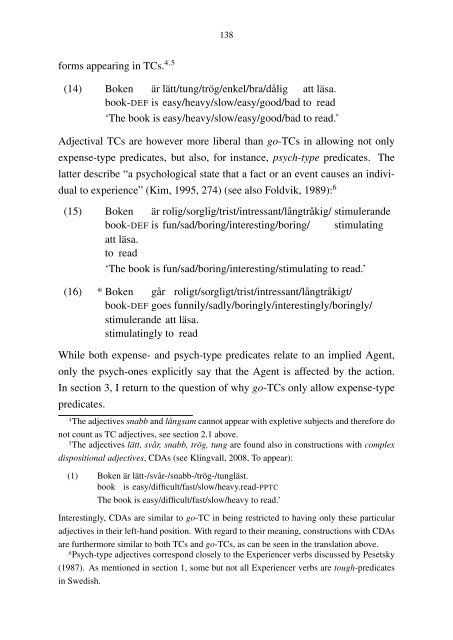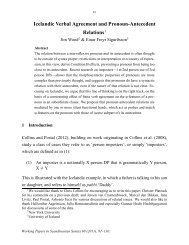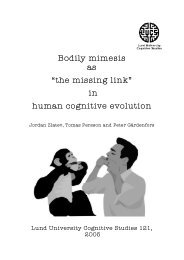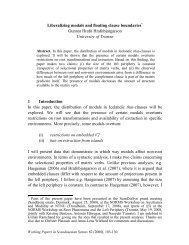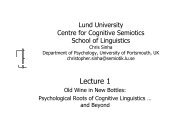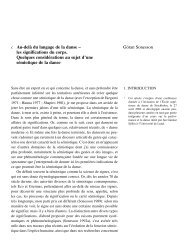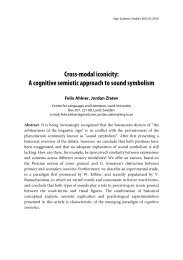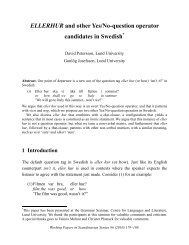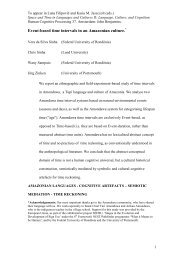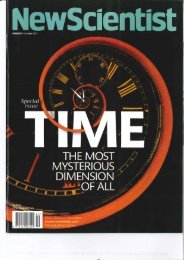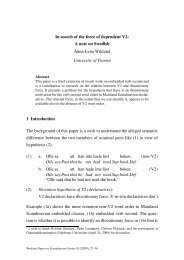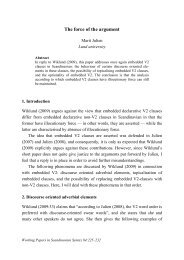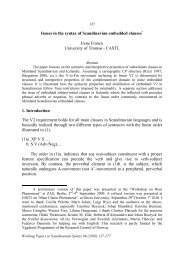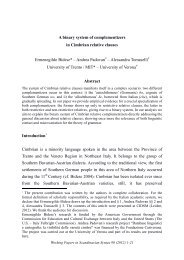Eva Klingvall On non-copula Tough Constructions in Swedish (PDF ...
Eva Klingvall On non-copula Tough Constructions in Swedish (PDF ...
Eva Klingvall On non-copula Tough Constructions in Swedish (PDF ...
You also want an ePaper? Increase the reach of your titles
YUMPU automatically turns print PDFs into web optimized ePapers that Google loves.
138forms appear<strong>in</strong>g <strong>in</strong> TCs. 4,5(14) Bokenbook-DEFärislätt/tung/trög/enkel/bra/dålig att läsa.easy/heavy/slow/easy/good/bad to read‘The book is easy/heavy/slow/easy/good/bad to read.’Adjectival TCs are however more liberal than go-TCs <strong>in</strong> allow<strong>in</strong>g not onlyexpense-type predicates, but also, for <strong>in</strong>stance, psych-type predicates. Thelatter describe “a psychological state that a fact or an event causes an <strong>in</strong>dividualto experience” (Kim, 1995, 274) (see also Foldvik, 1989): 6(15) Bokenbook-DEFatt läsa.to readärisrolig/sorglig/trist/<strong>in</strong>tressant/långtråkig/fun/sad/bor<strong>in</strong>g/<strong>in</strong>terest<strong>in</strong>g/bor<strong>in</strong>g/stimulerandestimulat<strong>in</strong>g‘The book is fun/sad/bor<strong>in</strong>g/<strong>in</strong>terest<strong>in</strong>g/stimulat<strong>in</strong>g to read.’(16) * Boken går roligt/sorgligt/trist/<strong>in</strong>tressant/långtråkigt/book-DEF goes funnily/sadly/bor<strong>in</strong>gly/<strong>in</strong>terest<strong>in</strong>gly/bor<strong>in</strong>gly/stimulerande att läsa.stimulat<strong>in</strong>gly to readWhile both expense- and psych-type predicates relate to an implied Agent,only the psych-ones explicitly say that the Agent is affected by the action.In section 3, I return to the question of why go-TCs only allow expense-typepredicates.4The adjectives snabb and långsam cannot appear with expletive subjects and therefore donot count as TC adjectives, see section 2.1 above.5The adjectives lätt, svår, snabb, trög, tung are found also <strong>in</strong> constructions with complexdispositional adjectives, CDAs (see <strong>Kl<strong>in</strong>gvall</strong>, 2008, To appear):(1) Bokenbookär lätt-/svår-/snabb-/trög-/tungläst.is easy/difficult/fast/slow/heavy.read-PPTCThe book is easy/difficult/fast/slow/heavy to read.’Interest<strong>in</strong>gly, CDAs are similar to go-TC <strong>in</strong> be<strong>in</strong>g restricted to hav<strong>in</strong>g only these particularadjectives <strong>in</strong> their left-hand position. With regard to their mean<strong>in</strong>g, constructions with CDAsare furthermore similar to both TCs and go-TCs, as can be seen <strong>in</strong> the translation above.6Psych-type adjectives correspond closely to the Experiencer verbs discussed by Pesetsky(1987). As mentioned <strong>in</strong> section 1, some but not all Experiencer verbs are tough-predicates<strong>in</strong> <strong>Swedish</strong>.


